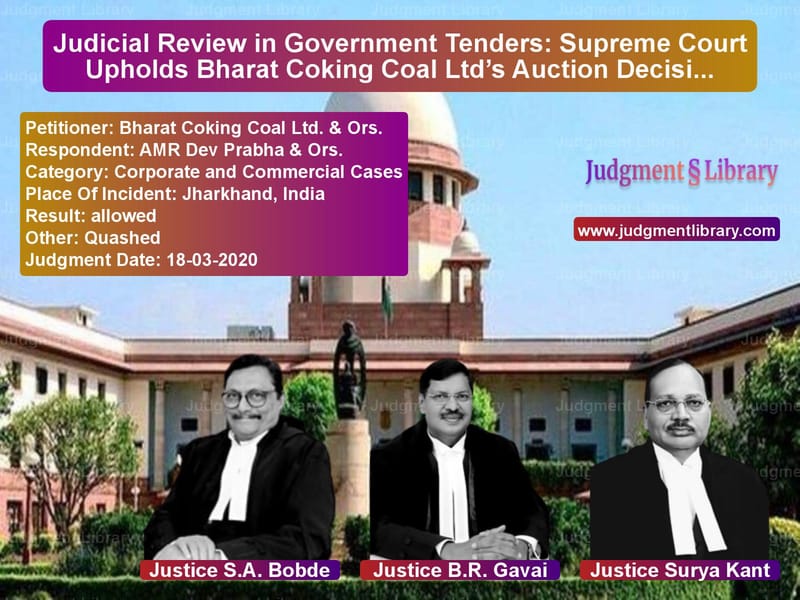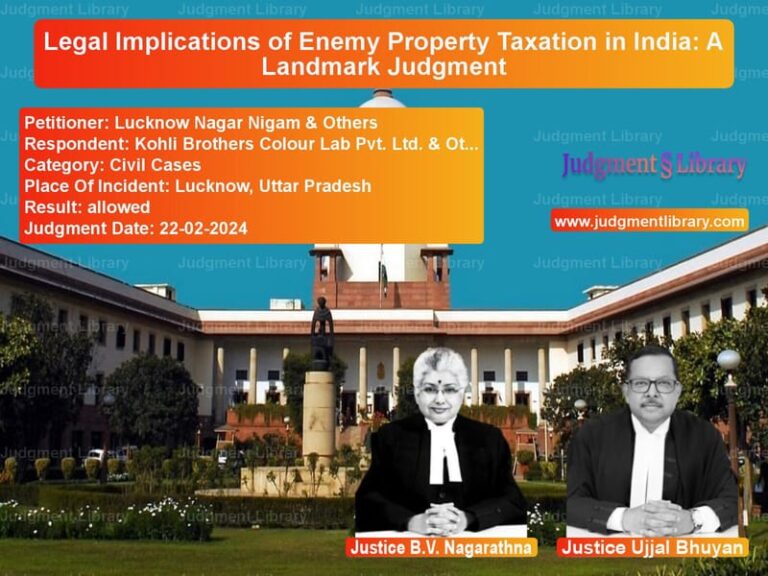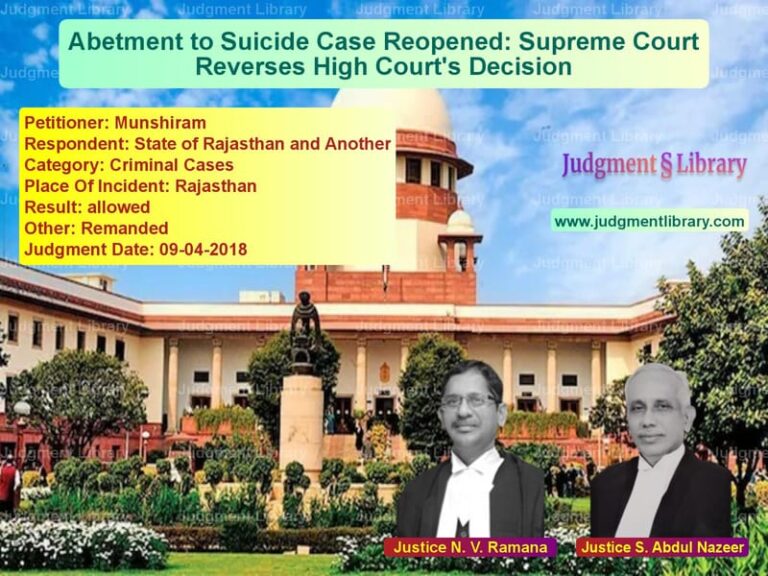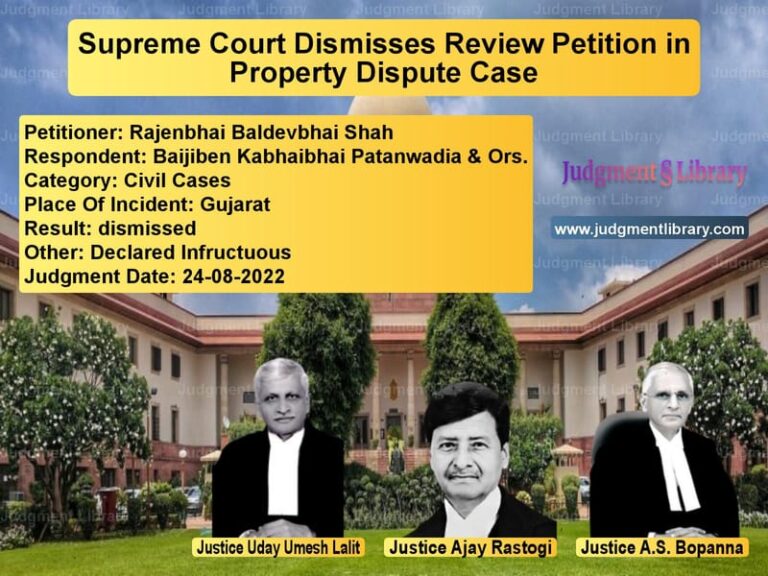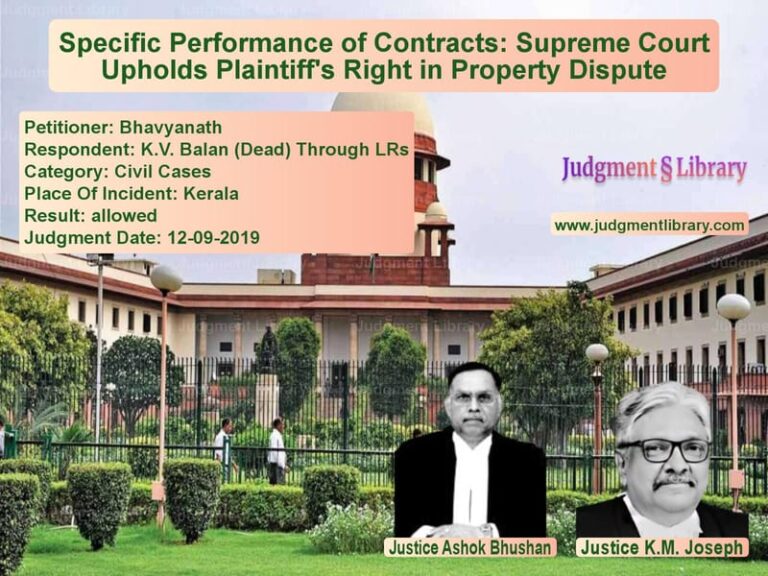Judicial Review in Government Tenders: Supreme Court Upholds Bharat Coking Coal Ltd’s Auction Decision
The case of Bharat Coking Coal Ltd. & Ors. v. AMR Dev Prabha & Ors. revolves around a dispute regarding the tender process for a large-scale coal mining contract. The Supreme Court was tasked with determining whether the auction process, which had been restarted due to alleged internet connectivity issues, was valid or if it constituted an unfair advantage to certain bidders. This case is crucial in clarifying the scope of judicial review in government tenders and the principles governing public procurement.
The dispute arose when AMR Dev Prabha, one of the bidders, challenged the auction conducted by Bharat Coking Coal Ltd. (BCCL) through an online reverse bidding process. The company argued that it had placed the lowest bid before the auction was abruptly restarted, leading to a different bidder winning the contract. The High Court of Jharkhand ruled in favor of AMR Dev Prabha, but the Supreme Court ultimately overturned this decision, ruling in favor of BCCL.
Background of the Case
The case originated from a tender issued by BCCL, a subsidiary of Coal India Ltd., for the hiring of Heavy Earth Moving Machinery (HEMM) for coal extraction, transportation, and related activities at the Dhansar-Ena colliery in Kusunda, Jharkhand. The estimated contract value was Rs. 1694.84 crores.
The online auction process was conducted on May 4-5, 2015, using the platform of C1 India Pvt. Ltd., a service provider for e-tendering. However, on May 5, 2015, multiple bidders reported connectivity issues, prompting C1 India to communicate with Tata Communications Ltd. (TCL), which provided internet connectivity. TCL confirmed that a dual fiber cut had caused network disruptions.
Due to the connectivity issues, C1 India decided to restart the auction at 2:30 PM after it had automatically closed at 1:03 PM. AMR Dev Prabha had submitted the lowest bid of Rs. 2345 crores before the closure, but after the restart, RK Transport won the auction with a bid of Rs. 2043 crores. BCCL subsequently awarded the contract to RK Transport.
Key Legal Issues
- Whether BCCL and C1 India acted lawfully in restarting the auction.
- Whether AMR Dev Prabha had a vested right in being awarded the contract as the lowest bidder before the restart.
- Whether the decision to restart the auction process was arbitrary and violated the principles of transparency and fairness in government tenders.
- Whether the High Court had overstepped its jurisdiction by interfering in a commercial decision of BCCL.
Arguments by the Petitioner (Bharat Coking Coal Ltd.)
BCCL and C1 India contended that:
- The auction was restarted due to technical issues that affected multiple bidders, and the decision was made to ensure a fair bidding process.
- The integrity of the auction process was maintained, as all bidders were given equal opportunity to participate in the restarted auction.
- AMR Dev Prabha voluntarily participated in the restarted auction, indicating acceptance of the decision to restart the process.
- The High Court erred in interfering with a commercial decision made by a government entity, as judicial review in tender matters should be limited.
- The contract was ultimately awarded to the lowest bidder in the restarted process, saving the exchequer Rs. 302 crores.
Arguments by the Respondents (AMR Dev Prabha & Ors.)
The respondents argued that:
- AMR Dev Prabha was the lowest bidder before the auction was restarted, and therefore, it should have been awarded the contract.
- The decision to restart the auction was arbitrary and lacked transparency, as no prior notice was given to the bidders.
- The contract was awarded in an unfair manner, benefiting a particular bidder at the expense of AMR Dev Prabha.
- The High Court correctly ruled that BCCL and C1 India had violated the principles of fairness and equality in public procurement.
Supreme Court’s Observations
The Supreme Court analyzed the principles of judicial review in tender matters and emphasized that courts should not interfere in commercial decisions unless they are illegal, irrational, or procedurally improper. The judgment stated:
“It is settled law that constitutional courts are concerned only with the lawfulness of a decision, and not its soundness. Courts ought not to sit in appeal over decisions of executive authorities or instrumentalities.”
The Court further noted that AMR Dev Prabha had voluntarily participated in the restarted auction, which indicated its implicit acceptance of the decision to restart the process. It also held that:
“Being declared the L-1 bidder does not bestow upon any entity a public law entitlement to award of the contract. The authority conducting the tender has the discretion to ensure fairness in the process.”
The Supreme Court found that the decision to restart the auction was made in good faith and was based on genuine technical difficulties. It ruled that:
- The High Court had overstepped its jurisdiction by interfering in a commercial decision.
- Judicial review in government tenders should be limited to ensuring procedural fairness, not evaluating the correctness of commercial decisions.
- The restarted auction led to significant cost savings for the government, reinforcing its legitimacy.
Final Judgment
The Supreme Court allowed the appeals filed by BCCL, C1 India, and RK Transport, setting aside the High Court’s judgment. The Court ruled that:
- The decision to restart the auction was lawful and justified.
- AMR Dev Prabha had no vested right to be awarded the contract as the lowest bidder in the initial auction.
- There was no procedural unfairness or illegality in the auction process.
Conclusion
This judgment clarifies the scope of judicial review in government tenders, reinforcing that courts should not interfere in commercial decisions unless there is clear illegality or procedural unfairness. The ruling highlights key principles in public procurement, including:
- The necessity of maintaining fairness and transparency in tender processes.
- The limited role of courts in reviewing commercial decisions of public entities.
- The importance of ensuring cost-effectiveness in government contracts while upholding procedural integrity.
By upholding BCCL’s decision, the Supreme Court has reinforced the principle that commercial wisdom should prevail in public procurement, provided that fairness and due process are maintained.
Petitioner Name: Bharat Coking Coal Ltd. & Ors..Respondent Name: AMR Dev Prabha & Ors..Judgment By: Justice S.A. Bobde, Justice B.R. Gavai, Justice Surya Kant.Place Of Incident: Jharkhand, India.Judgment Date: 18-03-2020.
Don’t miss out on the full details! Download the complete judgment in PDF format below and gain valuable insights instantly!
Download Judgment: Bharat Coking Coal L vs AMR Dev Prabha & Ors Supreme Court of India Judgment Dated 18-03-2020.pdf
Direct Downlaod Judgment: Direct downlaod this Judgment
See all petitions in Company Law
See all petitions in Corporate Governance
See all petitions in unfair trade practices
See all petitions in Judgment by S. A. Bobde
See all petitions in Judgment by B R Gavai
See all petitions in Judgment by Surya Kant
See all petitions in allowed
See all petitions in Quashed
See all petitions in supreme court of India judgments March 2020
See all petitions in 2020 judgments
See all posts in Corporate and Commercial Cases Category
See all allowed petitions in Corporate and Commercial Cases Category
See all Dismissed petitions in Corporate and Commercial Cases Category
See all partially allowed petitions in Corporate and Commercial Cases Category

